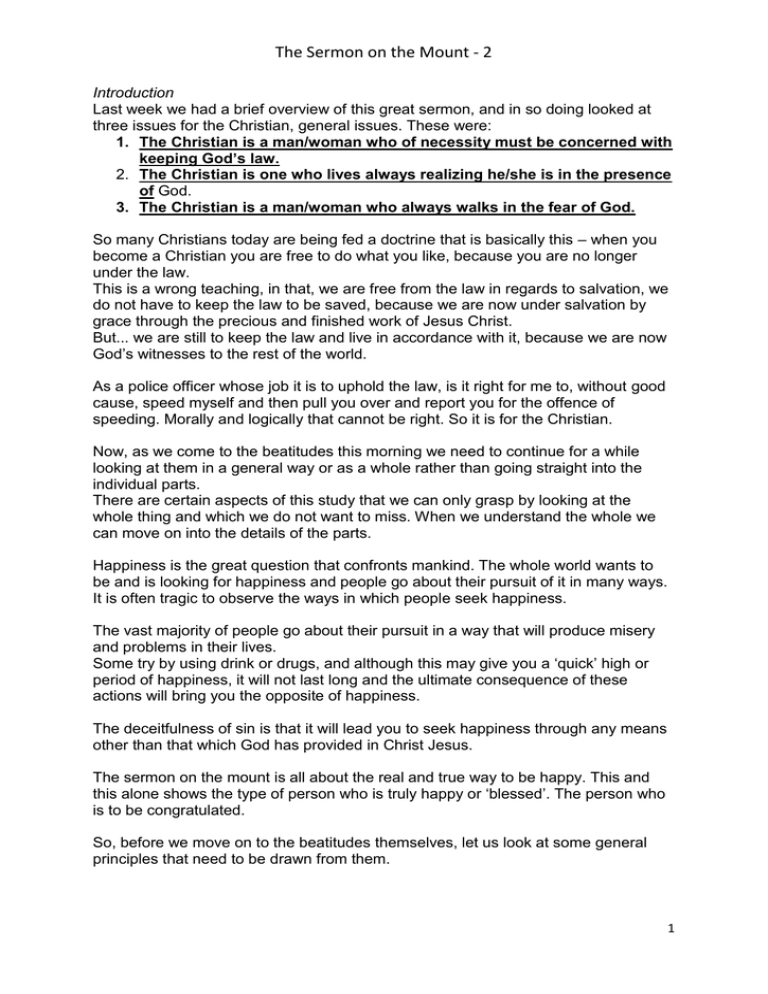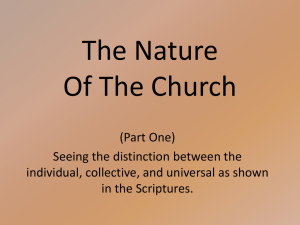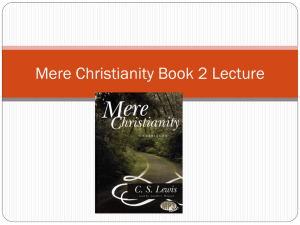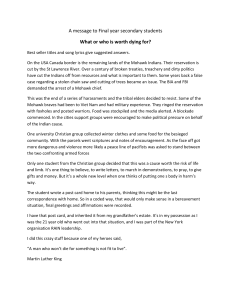Sermon on the Mount
advertisement

The Sermon on the Mount - 2 Introduction Last week we had a brief overview of this great sermon, and in so doing looked at three issues for the Christian, general issues. These were: 1. The Christian is a man/woman who of necessity must be concerned with keeping God’s law. 2. The Christian is one who lives always realizing he/she is in the presence of God. 3. The Christian is a man/woman who always walks in the fear of God. So many Christians today are being fed a doctrine that is basically this – when you become a Christian you are free to do what you like, because you are no longer under the law. This is a wrong teaching, in that, we are free from the law in regards to salvation, we do not have to keep the law to be saved, because we are now under salvation by grace through the precious and finished work of Jesus Christ. But... we are still to keep the law and live in accordance with it, because we are now God’s witnesses to the rest of the world. As a police officer whose job it is to uphold the law, is it right for me to, without good cause, speed myself and then pull you over and report you for the offence of speeding. Morally and logically that cannot be right. So it is for the Christian. Now, as we come to the beatitudes this morning we need to continue for a while looking at them in a general way or as a whole rather than going straight into the individual parts. There are certain aspects of this study that we can only grasp by looking at the whole thing and which we do not want to miss. When we understand the whole we can move on into the details of the parts. Happiness is the great question that confronts mankind. The whole world wants to be and is looking for happiness and people go about their pursuit of it in many ways. It is often tragic to observe the ways in which people seek happiness. The vast majority of people go about their pursuit in a way that will produce misery and problems in their lives. Some try by using drink or drugs, and although this may give you a ‘quick’ high or period of happiness, it will not last long and the ultimate consequence of these actions will bring you the opposite of happiness. The deceitfulness of sin is that it will lead you to seek happiness through any means other than that which God has provided in Christ Jesus. The sermon on the mount is all about the real and true way to be happy. This and this alone shows the type of person who is truly happy or ‘blessed’. The person who is to be congratulated. So, before we move on to the beatitudes themselves, let us look at some general principles that need to be drawn from them. 1 The Sermon on the Mount - 2 The first principle is this: a. ALL Christians are to be like this. In reading the beatitudes you see a description of what every Christian is meant to be. It is not a description of what SOME EXCEPTIONAL Christians ought to be. Jesus is not painting a picture of some extraordinary disciple for us to attain to. It is a description of every single Christian. The Church in general, often has the tendency to divide Christians into one of two groups, the religious and the laity, exceptional Christians and ordinary Christians, the one who makes his Christian life his vocation and those who are in secular employment. This division is totally unscriptural and very devisive. Yes there are differences in offices within the church 1COR 12:28-31 And in the church God has appointed first of all apostles, second prophets, third teachers, then workers of miracles, also those having gifts of healing, those able to help others, those with gifts of administration, and those speaking in different kinds of tongues. Are all apostles? Are all prophets? Are all teachers? Do all work miracles? Do all have gifts of healing? Do all speak in tongues? Do all interpret? But eagerly desire the greater gifts. The beatitudes are not a description of offices but of character. So from a standpoint of character there is no difference between one Christian and another. We are all ‘saints’ in Christ. So the beatitudes are not a description of the Hudson Taylor’s or the George Muller’s or the Wesley’s of this world, it is a description of EVERY Christian. We are all meant to conform to its pattern and to rise to its standard. Secondly, b. All Christians are meant to show all of these characteristics. If these be attitudes are for all of us, then it does of necessity mean that we should all be showing all of them. They are not there for us to pick and choose the ones we want. It would not be right for us to think that some Christians are meant to be ‘poor in spirit’ whilst others are meant to ‘mourn’, some to be ‘meek’ and others to be ‘peacemakers’. No; every Christian is meant to be all of them at the same time. It does have to be said though, that due to our imperfections and the ‘old man’ that still wars within us, some of us will show some beatitudes more than others. That does not excuse us, that simply is how it is. So, all Christians should show all the beatitudes at the same time. In fact as we look at the beatitudes it starts to become quite obvious that each one, of necessity implies the others. For instance, you cannot be ‘poor in spirit’ without ‘mourning’ in this sense; and you cannot mourn without ‘hungering and thirsting after righteousness’ and you cannot do that without being one who is ‘meek’ and a ‘peacemaker’. 2 The Sermon on the Mount - 2 The proportions to which they are showing may be different but they should all be present and meant to be present at the same time. This is similar to the gifts of the Spirit which are shown to us in Galatians 5: GAL 5:22-26 But the fruit of the Spirit is love, joy, peace, patience, kindness, goodness, faithfulness, gentleness and self-control. Against such things there is no law. Those who belong to Christ Jesus have crucified the sinful nature with its passions and desires. Since we live by the Spirit, let us keep in step with the Spirit. Let us not become conceited, provoking and envying each other. But we do not have time to consider the fruits here. The third principle is this: c. None of these descriptions refers to what we would call a natural tendency. None of the characteristics of the beatitudes come naturally to fallen man, they are produced by grace through the working of the Holy Spirit in us. I would emphasise this. They are a work of grace and not natural. We may see in people qualities that are similar to those mentioned, but they are not, as we shall see as we progress through this great sermon not the same thing that Jesus talks about. A man who appears to be a peacemaker but does not acknowledge Christ as his Saviour is not a child of God A woman who appears to be poor in spirit but does not know Christ will not inherit the earth. The natural characteristics of man are not the same as the beatitude characteristics of the Christian. But thank God that whatever earthly characteristics we may possess, when we come to know Jesus as our personal Saviour, no matter where we come from or who we have been, we ALL, through grace have these characteristics. They are a result of the working of the Holy Spirit within our lives. The fourth principle is this: d. These beatitudes are the essential, utter difference between the Christian and the non-Christian. The beatitudes are not a description of what a man does, the real point is that they differentiate between the Christian and the non-Christian and are therefore, of vital importance to us and should really concern us. The NT regards the fact that as Christians we are different as something basic and fundamental. When we hear testimonies of people coming to Christ, what do we hear? We hear of a life being changed from one thing to a different thing. From the old man to the new man. In baptism what do we show? The old life being left in the water and rising out of the water, signifying a new life in Christ. What the Church needs today is a clear understanding of this essential difference between the Christian and the non-Christian. 3 The Sermon on the Mount - 2 For the many in the Church the difference has become blurred. The world has come into the Church and the Church has become worldly. The line in the sand, as it were, is not as clear as it was. There were times when the distinction was very clear cut, and those times have always been the greatest eras in the history of the Church. We have been brought up thinking we must make the Church attractive to the man outside, and the idea is to become like him so that it is not such an effort to get him to come into the Church. Today we have ‘seeker sensitive’ Churches, ‘messy church’, ‘Men’s breakfasts’, Alpha courses and ‘worldly churches’. In WW1 there were popular padres who mixed with the men, they smoked with the men, and did this and that with the men, in order to encourage them. Some thought that by doing this, when the war was over the ex-service men would flock into the Church. But it did not happen. I am not saying that all these things are wrong. But that we must be careful not to desire to be like the world in order to attract the world. Instead we should make it our ambition to be like Christ, the more like him the better and the more like him we become the more we shall be different to those who are not Christians. 2CO 6:14-7:1 Do not be yoked together with unbelievers. For what do righteousness and wickedness have in common? Or what fellowship can light have with darkness? What harmony is there between Christ and Belial? What does a believer have in common with an unbeliever? What agreement is there between the temple of God and idols? For we are the temple of the living God. As God has said: "I will live with them and walk among them, and I will be their God, and they will be my people." "Therefore come out from them and be separate, says the Lord. Touch no unclean thing, and I will receive you." "I will be a Father to you, and you will be my sons and daughters, says the Lord Almighty." Since we have these promises, dear friends, let us purify ourselves from everything that contaminates body and spirit, perfecting holiness out of reverence for God. MT 6:24 "No one can serve two masters. Either he will hate the one and love the other, or he will be devoted to the one and despise the other. You cannot serve both God and Money. We are different from the world. The world looks upon a man differently to the way Christ looks upon a man. Let me show this in some detail. The Greek philosophers of the day despised a man who was ‘poor in spirit’. They considered him to be weak. Today, the world follows the same view. When asked the question “What makes a man?”, they would say someone who has status, power, wealth, position. 4 The Sermon on the Mount - 2 The truth of the matter is this, the Christian and the non-Christian belong to two entirely different realms. We are in this world but not of it. Jesus prayed in the garden of Gethsemene JN 17:13-16 "I am coming to you now, but I say these things while I am still in the world, so that they may have the full measure of my joy within them. I have given them your word and the world has hated them, for they are not of the world any more than I am of the world. My prayer is not that you take them out of the world but that you protect them from the evil one. They are not of the world, even as I am not of it. Paul writes to the Philippians PHP 3:17-21 Join with others in following my example, brothers, and take note of those who live according to the pattern we gave you. For, as I have often told you before and now say again even with tears, many live as enemies of the cross of Christ. Their destiny is destruction, their god is their stomach, and their glory is in their shame. Their mind is on earthly things. But our citizenship is in heaven. And we eagerly await a Savior from there, the Lord Jesus Christ, who, by the power that enables him to bring everything under his control, will transform our lowly bodies so that they will be like his glorious body. Conclusion The beatitudes show the characteristics of the Christian, a person who is essentially different from the non-Christian. Characteristics which are not earthly but given by grace through the work of the Holy Spirit in our lives. It is essential that we live different lives to those who are non-Christians, because only as we become more like Christ and less like the world will we know true happiness and be blessed. The vital questions we should ask ourselves are these: Do we belong to the kingdom? Are we ruled by Christ? Is He our King and Saviour? Are we showing these qualities in our daily lives? Is it our ambition to do so? If we have no desire to walk in this way, the simple conclusion is that we are not Christians. If we have a desire, but feel unworthy, then the kingdom of God is within us. As citizens of God’s Kingdom let us make it our ambition to walk as Christ walked, to become more like Christ in all we do. For His names sake, Amen. 5






